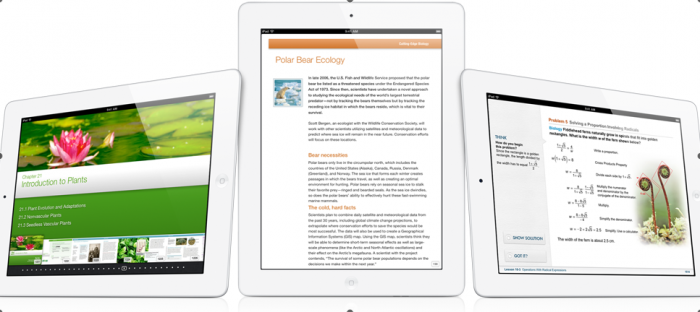I was scratching my head this morning after the announcement of iBooks 2 and Apple’s major play into the textbook arena. It struck me that they were already going in this direction and, as a result, this was an expected evolutionary step forward, not something worthy of an announcement. Having thought about it a bit more, however, I think there is actually a bigger story here. I’ll leave it to Carly to address the actual textbook aspect of this and instead, look at what is really the bigger picture that is key to today’s Apple announcement. You see, this isn’t about textbooks. It is not about Apple in the educational arena. This is about strategy and positioning. It is about Apple playing a long game and moving as fast as possible to lock people and institutions into its eco-system. Today shows that Apple, unlike the stock market, is thinking more about five years down the line than they are about immediate gratification.
Let’s step back a bit and look at the larger picture over the last few years.
When the iPhone was first announced it was a generalist consumer device. It combined a music player with a cell phone and a web browser. There were no apps, no streaming Bluetooth audio. Heck, it didn’t even have 3G at the time. When the iPhone was announced it had no target demographic other than people who are willing to shell out $500 for first generation hardware that ran an operating system that relied on the web.
A lot has changed since then and Apple has moved to not only expand their market but to also target specific markets in the process. Take a look at Apple with regard to business. As iOS has matured Apple has specifically targeted business people and enterprise, thereby making it increasingly possible for companies to let their employees choose to use an iPhone in a work setting. It has been bad news for RIM but great news for Apple and they are just getting started.
The same goes for the iPad. Apple has positioned the device so that it isn’t just a generalist consumer device, but, rather, it is something that can be adopted by companies and other institutions for use in a variety of ways. And in fact, it is working. A huge percentage of small businesses are expected to adopt the device this year.
Which brings us to today’s announcement. There’s no question that the iPad is an incredibly powerful educational tool. Just go to a restaurant and watch a three-year-old being entertained while their parents eat and you’ll quickly see the potential for using the device for learning and growth. The educational market is a huge potential market for Apple (or any company for that matter) and as kids are now growing up with touchscreen devices is inevitable that touchscreen tablets will play a significant role. They will, of course, eventually replace dead tree textbooks. Apple knows this. They want that market and they want it now. More importantly, and more to the point, they want it in 5 years and 10 years and 20 years. They know the market it in its infancy– It is really pre-infancy if we are being honest– but they see the potential and want it. So how does Apple get into the educational market and ensure that they remain there for the foreseeable future? Simple, get in early and get as many schools, universities and students onto your platform as quickly as possible. Get them in now and you will keep them in later. That’s what Apple set in motion today.
By getting publishers on board early Apple sets the stage for educational institutions to adopt the iPad now. And once any given institution has begun using the iPad the cost of moving to anyone else’s tablet becomes prohibited. That means they can sell textbooks at just $15 or less now and ensure they own the market going forward. It is exactly what they’ve done with device components and it’s what they’re doing in other areas as well. It is smart. It is aggressive. It is the long game.
Let me give you one practical example. One of the things I am doing over the next week and half is developing a program for teaching my bar mitzvah students their prayers. Once it is completed they will have access to each of the prayers they need to learn with each sentence of each prayer accessible to them both visually and audibly. To accomplish this I’m using the IOS application of MentalCase. It is an advanced flash card program that lets me add the text and the audio to each prayer line by line. It is a hugely time-consuming endeavor but it is one that is worth the effort. But here’s the thing, once I’ve completed the program I’m going to be locked into using iOS devices. The application doesn’t exist on any other platform and, even if it did, the amount of effort it would take to port the work I’m doing now over to other platforms would be prohibited. Therefore, at least for the foreseeable future, my synagogue’s educational process is going to be tied to the iPad and the iPod Touch. Now with that as a backdrop step back and look at what Apple did today.
Schools will see the availability of textbooks that are interactive and engaging. Students will see that the textbooks are less expensive in their electronic form than they are in their dead tree form. As a result, the expense of the iPad is, to a large extent, made up for by the savings in textbooks. Students will buy an iPad and the textbooks and teachers will increasingly design their curriculum around the interactive textbooks. And in the process students, teachers and institutions alike will become locked into Apple’s products and their echo system like never before. It is a brilliant strategy but that’s no surprise.
